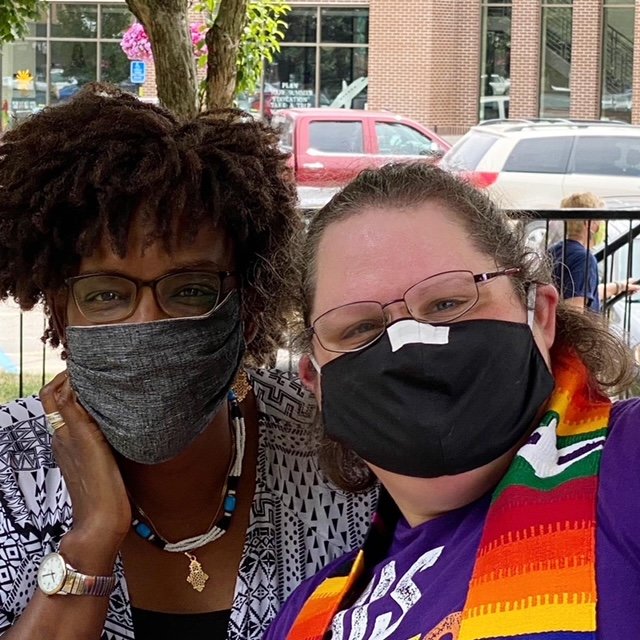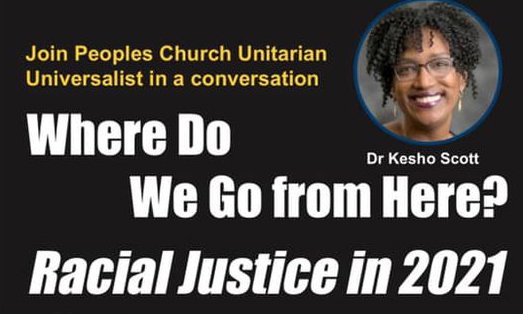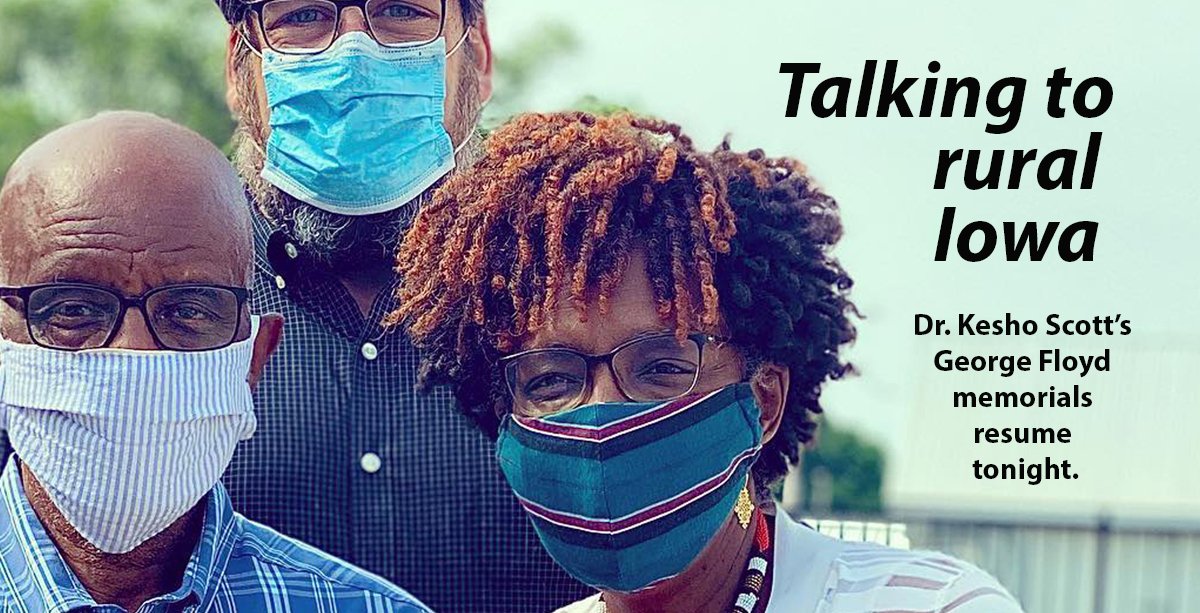CEDAR RAPIDS — It’s been eight months since George Floyd’s death triggered nationwide historic protests against racial injustice and police brutality.
But the work of memorializing him, and so many other people victimized by inappropriate policing, isn’t over, says Kesho Scott. Tonight at 7 p.m., from Cedar Rapids, Scott will lead an online memorial of Floyd, resuming a series she began this summer at the invitation of seven small Iowa towns.
The retired Grinnell College professor has worked for decades on behalf of social justice, including on the streets of Detroit where she grew up. But with this series, she is particularly focused on reaching out to Iowa’s small towns. Working with Belle Plaine City Manager Stephen Beck, Scott has already held similar memorials in Belle Plaine, Grinnell, Marengo, Mingo, Washington, and Williamsburg.
The first step of each appearance, she says, is an invitation from the community itself.

“The idea of community speaking for themselves and challenging the myth that rural Iowa communities are inherently racist in their isolation,” says Scott, “that they’re misinformed, that there aren’t people who challenge the current practices of some police departments against African-Americans or other people of color … The whole point of the memorial is to challenge this notion and allow people in their communities to speak for themselves.”
“I am an invited presence. We’re neighbors, just mile markers away. And we are continuing to support these communities.”
Scott specializes in “unlearning isms.” The event page describes her technique as one of “affirmative duty” that “moves people toward being actively and person- ally anti-racist and anti-sexist.” Scott will be joined by two white women who will share their experiences as allies standing up for social justice in their small communities. They include the Rev. Kate West, who has been pastor of First Congregational Church of Christ in Belle Plaine for seven years.

West will share about her attempt to dialogue with her congregation about the death of Floyd and others, police brutality and systemic injustice, and the backlash she received from her congregation when she mentioned the words “George Floyd” and “white privilege” in the same sermon.
“I kind of do feel that with 45, there has been entrenchment. I’m not perfect either but there is definitely this emboldenment, this empowerment going on right now, of ‘I’m right, you’re wrong’ kind of thinking and mentality. Especially in Benton County, where it is majority Republican-controlled and run, especially in the more rural parts of Benton County, you feel so isolated from each other.” Jackie Jordan will share her experience as the parent of biracial children in Marengo.
Meredith Hamlyn, who helped organize a Kesho Scott event in Williamsburg over the summer, said she was encouraged to hear Scott’s outreach had resumed over the winter months. “Having her come and speak in Williamsburg, and having that event in general, and having that scholarly voice set a precedent that there are people that care about racial equality,” Hamlyn said. “The first step is deciding not to be passive when you see racial inequality happen. I feel like that was the step we took that day with the peace proclamation. It allowed people to come together and see there were more of us than we expected….. Bringing everyone together was just what was needed.”
All three towns are, sadly, noted in a historic book as possible or probable “sundown towns,” places where Blacks and People of Color were expressly banned or unwelcome, either through actual city policies or signs or community norms. But Scott says her message is one of empathy, open discussion, and education – not of finger-pointing.
“I am constantly asking people to look at ‘What does it mean to do the work? To change one’s consciousness? Reflect on how you grew up.’ Not to make excuses. We are all responsible for being more inclusive. For correcting our misinformation, for reaching our hand out to create unity. You don’t need mass numbers to do that, you can do that on your own, in your community.”
Scott says the Jan. 6 insurrection makes these memorials even more timely — and even more intersectional. “Just like the world saw, with the knee on the neck of George Floyd, how it changed our consciousness,” she says. “No one had to be convinced anymore that violence against black men in particular was inevitable. (On Jan. 6), no one had to be convinced of what we saw in the insurrection in Washington, D.C.”
“They were the voices of people who don’t want to respect our Constitution, who have been goaded on by members of our national leadership to behave in such a way. They were people who chose worship of an individual, and misinformation, over their country. What’s important to me is to make that connection.”
To participate in tonight’s online memorial, click here.
(cover photo courtesy Stephen Beck and features Dr. Kesho Scott (far right), Stephen Beck (Belle Plaine City Manager and event liaison) and Tesfay Teklu (Kesho’s partner).


